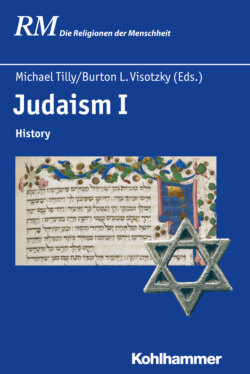Читать книгу Judaism I - Группа авторов - Страница 49
На сайте Литреса книга снята с продажи.
3.2 On the origins of the LXX—legend and history34 Letter of (Pseudo-)Aristeas
ОглавлениеAccording to the account in the Letter of (Pseudo-) Aristeas, the initiative for the translation of the Torah came from King Ptolemy II Philadelphus (283–246 BCE) or his librarian Demetrius of Phaleron. This attribution is continued into rabbinic times, when there is talk of the Torah of »King Talmai«. The connection with Ptolemy II is likely to be correct only in terms of the date, the mid-third century BCE. If, as the Letter of Aristeas claims, it was translated for library purposes, the Greek literary language would have been used, not Koine.
In a letter to his brother, the narrator, »Aristeas,« tells of an event at the time of King Ptolemy II Philadelphus (283–246) and his librarian Demetrius of Phaleron (died 282), which begins with the request to the Jerusalem High priest to send Greek expert translators to translate the Torah into Greek in Alexandria. Thereupon, the High priest sent six translators from each tribe, a total of 72 (Let. Aris. 47–50). The author claims to be a contemporary Greek witness at the Ptolemaic court, but he is a second-century Jew telling Alexandrian Jewry and their non-Jewish contemporaries of the excellence of Jewish law.
At the conclusion, the author puts his own question on the lips of the king: »How have none of the historians and poets undertaken to make mention of these enormous achievements (i.e. as the Jewish law, the Torah)?« (312).35 The answer is given by the librarian: »Because the legislation is sacred and has come about through God!« (313). He gives an account of Theopompus (born 377 BCE), who for more than thirty days was out of his mind when he used in his history something that had already been translated earlier, as he had presumed to share the divine with impure people (314f.). Further, the tragic poet Theodectes (ca. 377–336) was struck blind because he had wanted to use something from it in a drama.
Two aspects deserve to be highlighted: first, the authority to use and interpret the Torah is given only to Jews. Second, the use of earlier, imprecise translations leads to trouble; but now there is one correct and authorized translation. After its completion, it was confirmed by the priests, the elders of the translators, the representatives of the Jewish politeuma, and the leaders of the congregation, and protected against changes by curses:
›Since the exposition has been made well, piously and accurately in every respect, it is good that it remains just as it is and there be no revision at all.‹ And then all assented to what had been said. They ordered that there be a curse, just as is their custom, upon anyone who might revise (scil. the translation) by adding or changing anything at all of that had been written or by making a deletion (310f.).36
This corresponds to what later became known as the »canonization formula.« The intention was that this would protect the wording of the Greek translation. This is confirmed in the final exhortation of the king, »that great care be taken of the books and that they be preserved reverently« (317).37
